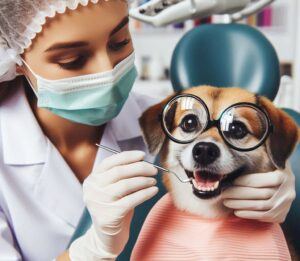Beyond the Smile:
How Regular Dental Care Boosts Overall Well-Being

Pet dental health involves more than keeping their teeth shining. It is essential to their general well-being. Similar to humans, pets may experience a range of dental conditions that substantially impact their quality of life.
Neglecting your pet’s dental health can result in several issues, including unpleasant infections, foul breath, and even systemic diseases. These problems affect more than just the mouth; they can also affect your pet’s kidneys, liver, and heart. Seriously, it’s all connected.
The germs that cause plaque and tartar to build up on teeth are one of the leading causes of this. If ignored, they have the potential to infiltrate your pet’s circulation and severely damage internal organs. So, that cute smile needs more than just an occasional check; it deserves regular care.
Cats and dogs have different dental needs. Cats often face issues like tooth resorption, while dogs are prone to periodontal disease. Knowing what to look for in your specific type of pet can make a big difference.
Investing time in dental care isn’t just a chore; it’s an investment in your pet’s happiness and health. Regular dental care can save you and your pet from a lot of pain and costly treatments down the road.
Common Dental Problems in Pets
Pets can suffer from a variety of dental issues, many of which can sneak up on you. Knowing what to watch out for can help you catch problems before they become serious.
- One of the first signs of dental trouble is bad breath. We all know our pets aren’t known for minty-fresh breath, but if it’s particularly foul, it might be a sign of something more serious. Along with bad breath, look out for red, swollen gums or any sign of discomfort while eating.
- Periodontal disease is a big one to watch for. It starts with plaque and tartar buildup, which can cause infections and tooth loss. Tooth resorption is another issue, especially for cats. This painful condition involves the breakdown of the tooth structure and can require extraction.
- Dental issues do more than just make your pet uncomfortable; they can lead to weight loss, difficulty eating, and changes in behavior. Imagine having a constant toothache and how that might affect your daily life. Pets can feel just as miserable as we would.
- Here, veterinary appointments are quite necessary. It’s time to contact an expert if you see any changes in your pet’s dental health. Your pet may experience a quicker return to normalcy and less intrusive therapy if the condition is discovered early.
Benefits of Regular Professional Dental Cleaning
Regular professional dental cleanings do more than freshen up your pet’s mouth; they can improve their health and quality of life. Think of them as essential as your dental check-ups but tailored to what cats and dogs need. A professional dental cleaning should be done once a year so your pup can stay in top notch shape.
- One significant benefit is preventing plaque and tartar buildup. Even if you’re diligent with home care, professional cleanings can reach those tricky spots you might miss. This helps ward off dental diseases like periodontal issues, which can lead to more significant problems.
- Another win is the reduction of bad breath. A thorough cleaning gets to the root of the problem, pun intended, making those cuddle sessions far more pleasant for everyone involved.
- Early detection of dental issues is another huge plus. Vets can spot problems you might not notice, like tiny fractures or gum disease creeping in. Early detection reduces suffering for your pet and frequently lowers treatment costs for you.
- These regular cleanings also benefit the general health of your pet. You can lessen the possibility of bacteria getting into their bloodstream and harming important organs by brushing their teeth regularly. They might even live longer as a result. With a return on investment like that, one cannot dispute.
Home Dental Care Practices for Pets
Maintaining your pet’s oral health extends beyond routine cleanings by a professional. Regular in-home care is also very important. It might seem daunting, but with the right techniques and tools, it can become a smooth part of your routine.
 Brushing comes first. This is your frontline defense against plaque and tartar. Using a pet-specific toothbrush and toothpaste makes all the difference. Human toothpaste isn’t suitable for pets, so go for pet-friendly flavors like chicken or beef to make the process easier. Aim to brush daily, but even a few times a week is beneficial.
Brushing comes first. This is your frontline defense against plaque and tartar. Using a pet-specific toothbrush and toothpaste makes all the difference. Human toothpaste isn’t suitable for pets, so go for pet-friendly flavors like chicken or beef to make the process easier. Aim to brush daily, but even a few times a week is beneficial.
There are other options for pets who just won’t tolerate brushing. Dental chews and toys can help reduce plaque and keep those teeth busy. While they’re gnawing away, these treats are working to clean their teeth. It benefits both parties!
Don’t underestimate the power of diet. A balanced diet is crucial for maintaining your pet’s dental health. Specially formulated foods are available to reduce plaque and tartar buildup. Before making any major dietary changes for your pet, always consult with your veterinarian to ensure it is appropriate for their needs.
Implementing these home care practices can seem like a lot, but over time it becomes a natural part of your routine. Just like you brush your teeth daily, adding these simple steps will ensure your pet’s dental health stays on point.
Creating a Dental Care Routine for Your Pet
Establishing a regular dental care routine may sound like a tall order, but it’s easier than it seems. Think of it as an investment in your pet’s future health and well-being.
- Start with small steps and build gradually. Begin by introducing your pet to the toothbrush and toothpaste. Let them sniff and lick to get acquainted. Make it a positive experience with praise and even a few treats.
- Once your pet is comfortable, try short brushing sessions. You don’t have to do all the teeth at once. Gradually increase the duration as your pet gets used to the process. Consistency is key here; regular short sessions are more effective than occasional long ones.
- Scheduling regular veterinary check-ups is crucial for maintaining oral health. These annual visits allow your vet to perform professional cleanings and monitor any emerging dental issues. It’s a collaborative effort between you and your vet to ensure your pet’s mouth stays healthy.
- Lastly, keep an eye on your pet’s behavior and oral health. Look for signs of discomfort, changes in eating habits, or bad breath. Being proactive helps catch issues early, so your pet stays happy and healthy.
Creating a routine takes patience, but the benefits are worthwhile. Your pet depends on you to keep them in top shape, and good dental care is a big part of that.
If you have any questions, personal experiences or tips to share, I’d love your feedback. Please make comments below. Thanks for joining me on this journey of the benefits of regular dental care.
-Janice-
